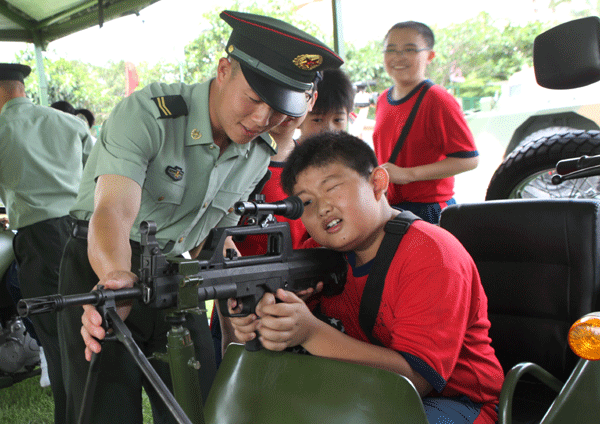Troops refuse to gamble with Macao's security
Updated: 2014-12-05 08:05
By Zhao Shengnan(China Daily)
|
||||||||
As the 15th anniversary of the region's return to the Chinese motherland approaches, Zhao Shengnan meets the men and women of the local PLA garrison.
 |
|
Two soldiers from the People's Liberation Army garrison in the Macao Special Administrative Region during a training session at the barracks.PROVIDED TO CHINA DAILY |
Standing in the shadow of two giant casinos, the People's Liberation Army barracks in the Macao Special Administrative Region is a reminder that an oasis of discipline and duty is no place for those prone to taking risks.
As visitors from all over the world seek their fortunes around-the-clock, the troops housed in the 65,333- squar emeter base on Taipa Island have left nothing to chance since Macao returned to the Chinese motherland on Dec 20, 1999.
"We are here to safeguard stability and prosperity, and serve as a key window for Macao residents to view the entire PLA," Senior Colonel Wang Wen, the garrison commander, said, ahead of the 15th anniversary of Macao's return.
The government of Macao may "when necessary" ask the central government to allow the garrison to assist in maintaining public order, or help with disaster relief.
The garrison is ready to serve and is fully equipped to tackle potential emergencies, including fire prevention and public health emergencies, Wang said.
However, the troops keep a low profile and are confined to barracks,where they trainquietly, mindful that residents live nearby.
"We never interfere in the region's governance or disturb the people, as required by the Basic Law — Macao's miniconstitution — and Garrison Law," said Wang, who was stationed at the PLA garrison in Hong Kong for eight years before being sent to Macao in July.
The garrison has bases in Macao and the neighboring city of Zhuhai in Guangdong province. When the soldiers arrived in Macao, the world's most densely populated city, the lack of space became a major consideration.
The troops in the New Port barrackson the Macao Peninsula have to conduct their exercises on the base, such as quickly ascending about 20 flights of stairs or running around the perimeter of a building base dozens of times a day.
Increasing exchanges
 |
|
A boy learns how to use a light machine gun under a soldier’s guidance. More than 40,000 people have visited the PLA barracks since it began opening its doors to the public.PROVIDED TO CHINA DAILY |
Every dorm in the barracks is equipped with sound-proofing equipment, and low decibel loudspeakers ensure the early morning bugle call doesn't disturb residents outside the barracks. Meanwhile, field training and annual troop rotations between the bases are conducted at night to minimize disruption to local transport, and live ammunition practice is only conducted in Zhuhai.
Although space is at a premium, that doesn't stop the garrison from making roomto involve residents in a range of activities.
More than 40,000 people have visited the barracks on the 27 occasions it has opened its doors to the public during the past decade. At these open houses, visitors can view the facilities and watch soldiers perform simulated combat procedures.
The open houses are immensely popular — Major Cui Shengming recalled that when he planned to give away free tickets for an open house at 8 am, he was surprised to hear that people had been lining up since 4 am.
The garrison has also organized 10 military summer camps for 1,200 local teenagers, and participated in public activities, such as planting more than 7,000 trees, donating 500,000 milliliters of blood, and visiting the elderly and universities.
Earlier this year, when the troops visited a local kindergarten for the first time, First Lieutenant Zhou Yiqi learned from the teachers that many of the children were so eager to meet the PLA soldiers that they skipped the daily noontime nap, and stared out of the windows as they waited for the troops to arrive.
After she'd played games, played music and danced with the children, Zhou found it difficult to say goodbye. "When I meet these kids, I feel motivated to do my job even better, just like the time I saw an elderly resident give us a thumbs-up while we were conducting field training at night," she said.
Based on the successful experiences so far, the garrison will open up further and explore more ways to interact with local people, according to Wang.
Cui, who works in the garrison's communication station, said: "They (the local people) want to know us better. We've learned a lot from the local people. We are proud to be a window and a bond between Macao and the Chinese mainland."
- China's State Council appoints senior Macao officials
- Macao reports economic contraction
- DreamWorks-themed ice sculpture festival kicks off in Macao
- HK, Macao accountants step into Pingtan
- Macao packs a big punch
- Album zooms in on Macao's fascinating culture
- Things you need to know about Macao
- Trending across China: PLA before and after photos set off Internet frenzy

 Obamas usher in Xmas with lighting of national tree
Obamas usher in Xmas with lighting of national tree
 Family of nine struggles to survive
Family of nine struggles to survive
 World news pictures of the year 2014
World news pictures of the year 2014
 S. Africa marks first anniv. of Mandela's death
S. Africa marks first anniv. of Mandela's death
 China's budget aviation sector has new comer
China's budget aviation sector has new comer
 Archeologists explore ancient ship of Song Dynasty
Archeologists explore ancient ship of Song Dynasty
 The 4th Canada-China Business Excellence Awards
The 4th Canada-China Business Excellence Awards
 Golden year for Chinese cinema
Golden year for Chinese cinema
Most Viewed
Editor's Picks

|

|

|

|

|

|
Today's Top News
Xi vows military boost
Top US justice official promises probe after NYC chokehold death
China, Japan take step to soothe relations
Best Buy bids adieu to China after struggle with high costs
Hotpot chain to raise $129m in HK to increase outlets, improve logistics
Obama upbeat on future of US-China ties
Opening minds through film
Meet an original Bambi artist, 104
US Weekly

|

|







